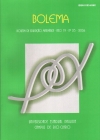“Case Studies in Mathematics Education”
Abstract
Case studies have become remarkably popular in mathematics education research. They have both their strengths and their weaknesses. This paper discusses what characterizes this research and how it is different from other ways of conducting research; the nature of knowledge that is produced, especially when they are done within an interpretative perspective; and what criteria of quality may be used to assess their value. A case study focuses on a well-defined entity such as a program, an institution, an educational system, a person, or a social unit. It aims for acquiring a deep understanding of “how” and its “whys”, recognizing its unity and identity. It is deliberately particularistic; seeking to discover what is most essential and characteristic in it. A case study may draw upon an explicit theoretical orientation. Besides, it may follow an interpretative perspective, that seeks to understand how the world is seen from the perspective of the participants. Or else it may follow a more pragmatic perspective, seeking to create, to the extent possible, a global, complete, and coherent account of the object of study. The paper claims that the essential specific qualities of a case study include a clear definition of the object of study, the evidence of fundamental characteristic features of the case, and the fact that it adds knowledge to the existing knowledge. Keywords: Case Studies. Research Methodology. Interpretative Research.Downloads
Published
2008-10-20
Issue
Section
SEÇÃO ESPECIAL
License

>>>>> BOLEMA: Mathematics Education Bulletin = BOLEMA: Boletim de Educação Matemática, Rio Claro, SP, Brasil - eISSN 1980-4415 - está licenciado sob Licença Creative Commons


